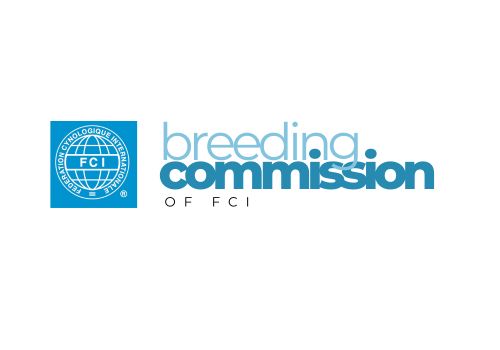Comisión de Cría de la FCI

Presentation
The Breeding Commission is one of the FCI non-mandatory commissions.
The role of this commission is to represent the breeding activities under the umbrella of the FCI.
The Breeding Commission is made up of delegates from countries (i.e. National Canine Organisations - NCOs) that are members of the FCI and want to have a representative in this commission.
NCOs that are interested can nominate one (1) Commission Member on the occasion of the FCI General Assembly.
To become effective, all decisions made by the commission have to be approved by the FCI General Committee.
The Breeding Commission is led by a President, a Vice-President and a Secretary, chosen by the delegates of the commission. The election to these positions are held every two years (after the General Assembly)
At the general meeting of the Breeding Commission held on February 24, 2024, in Madrid, the following delegates were elected to the praesidium of the commission.
 |
 |
 |
| Nikola Smolic (Croatia) |
Anna Morgan (Spain) |
Viera Staviarska (Slovakia) |
| President |
Vice-President |
Secretary |
If you wish to communicate with a representative of a country/NCO, we invite you to contact the secretariat of the respective country/NCO directly to obtain the necessary contact information.
Mission and goals
MISSION:
The FCI Breeding Commission is dedicated to promoting sustainable, fit for function, responsible and ethical dog breeding practices worldwide. Our mission is to enhance the welfare, health, and genetic diversity of pedigree dogs while promoting adherence to professional standards.
The FCI Breeding Commission is dedicated to promoting and establishing responsible and ethical breeding practices for pedigree dogs throughout the world.
As part of our commitment, the commission actively provides expert recommendations and guidelines to FCI national canine organisations (NCO), making the highest breeding standards more accessible to breed clubs and individual breeders. Our goals are to foster a community of informed and conscientious practitioners.
Short-term goals
- Breeder education programmes: develop comprehensive educational material specifically tailored for breeders. These resources should cover topics such as health, genetics, nutrition, animal behaviour and responsible breeding practices.
- Support and organisation of professional events with the aim of presenting the latest expertise in pedigree dog breeding.
- Genetic diversity workshops: conduct workshops that emphasize the importance of maintaining genetic diversity within breeds. Educate breeders on the various risks like inbreeding.
- Breeding guidelines enhancement: Scientific advisory panel: form a panel of experts (veterinarians, geneticists, behaviourists) to review and update breeding guidelines. Ensure that guidelines align with the latest scientific findings.
- Ethical breeding practices: expand breeding guidelines to include universal ethical codes. Address topics like puppy socialization, responsible rehoming, breeder accountability, well-being of all dogs, especially brood bitches and their puppies.
- Create recommendations for a mentorship opportunity where experienced breeders guide newcomers. Foster a culture of knowledge-sharing and mentorship.
- Collecting data related to breeding for the correct evaluation of weak and strong points, and as an important source for the creation of professional guidelines and the preparation of professional materials that will support a professional approach to breeding.
Long-Term Goals:
Genetic Diversity:
- Advocate for maintaining genetic diversity within breeds.
- Preserve and keep the breeding of pedigree dogs, in accordance with the customs, traditions and breed standards established by the NCO and the breed-specific breed clubs, all within the framework of the legislation in force in each of the member countries of the FCI.
- Contribution to the preservation of the breeds with very low genetic diversity through systematic and scientifically based crossbreeding.
Ethical Breeding Practices:
- Establish codes of ethics for breeders, emphasizing transparency, honesty, wellbeing and health of dogs.
- Monitor compliance with ethical standards.
- Promote responsible breeding, through the application of current legislation, the application of protection methods and practices to different pedigree dogs. Improve the welfare and health of pedigree dogs, within the breed standards, according to new innovations and scientific, technical and legal methods.
Collaboration:
- Foster collaboration with other FCI commissions.
- Create commitments with the FCI and the relevant NCO (owners of the breed standards) when needed for the establishment of worldwide uniform parameters for the breeding of pedigree dogs.
- Collaborate with the NCO to create criteria aimed at improving the breeding of pedigree dogs in accordance with current FCI Sections and national legislation.
- Foster collaboration, when needed, among breed clubs, veterinarians, geneticists and institutions etc. to bring and establish the best breeding advice.
- Work with all national organisations to harmonise breeding practices globally.
- Work together with the FCI Show Judges Commission, to promote the judges focus on the wellbeing and health of the dogs.
- Cooperation with other FCI commissions to ensure we follow the same missions and goals.
- Promote meetings and update talks on breeding in accordance with national legislation and regulations, legislation of each section (Europe/Asia, Africa and Oceania/Americas and the Caribbean) and with the regulations established by FCI.